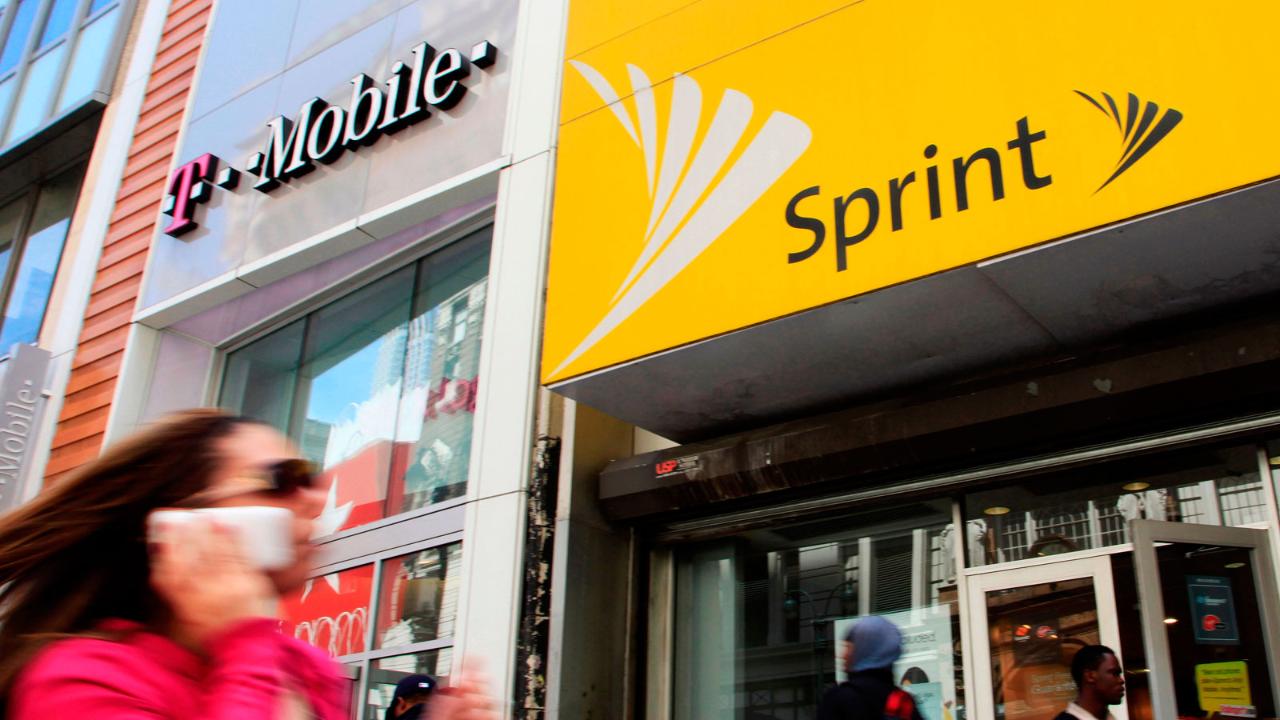T-Mobile, Sprint marriage on its way down the aisle after long-haul merger talks: Here's how it began
T-Mobile and Sprint's $26-billion tie-up is finally a done deal after years of wrangling.
The Department of Justice announced that it, along with five states' Attorneys General, reached a settlement, removing a major obstacle to the merger.
Joining forces is expected to help the cell carriers compete against Verizon and AT&T -- the two largest carriers in the country.
However, getting here was no cakewalk. FOX Business takes a look at the ups and downs the two companies faced before eventually prevailing.
First round of talks collapse
After a proposed merger between T-Mobile and AT&T collapsed in 2011, T-Mobile CEO John Legere was back with another deal, this time to combine with Sprint. But that effort fizzled out in 2014 before it could even be reviewed by the DOJ when the Obama FCC voted they shouldn't get together.
Sprint's financials continue to weaken
Antitrust chief Makan Delrahim, at the Milken Institute conference, told FOX Business that company officials alerted the DOJ that, without the deal, Sprint’s future was in doubt.
He mentioned there were questions about whether the company would be strong enough to effectively compete with other major wireless players such as AT&T, Verizon and its proposed merger partner T-Mobile.
DISH CEO Charlie Ergen thorn in deal's side
As FOX Business reported in early July, the controversial chief of telecom giant Dish Network Corp. was looking to wrap up a deal where he would buy Spectrum from the combined T-Mobile-Sprint and create a fourth wireless carrier — a necessary hurdle for the transaction to pass antitrust muster at the DOJ, government officials said. But Ergen’s famously hardball negotiating style and deal-making abilities had both T-Mobile and the DOJ concerned about striking an agreement with him, according to people with direct knowledge of the transaction.
And those concerns posed a significant hurdle in bringing the deal to fruition and delayed a final DOJ decision on the transaction, these people said.
| Ticker | Security | Last | Change | Change % |
|---|---|---|---|---|
| S | SENTINELONE INC | 13.22 | +0.29 | +2.24% |
| TMUS | T-MOBILE US INC. | 197.39 | -4.47 | -2.21% |
| T | AT&T INC. | 27.13 | -0.18 | -0.66% |
| VZ | VERIZON COMMUNICATIONS INC. | 46.29 | -0.77 | -1.64% |
AGs oppose deal
The antitrust lawsuit filed by 10 states and Washington, D.C. took years of talks at the negotiating table. Both companies promised to not raise prices for three years in response to those worries. The settlement requires a large divestiture package which means both companies will have to shed properties to make the merger legal.
Here's how the T-Mobile, Sprint merger could affect customers
5G promise and national security
Officials in the Trump White House and the president himself were on board with this merger for another reason: The new company would emerge as a major player in the development of a superfast 5G wireless network, allowing the U.S. to compete against countries like China.
The Trump administration believed U.S. competitiveness in 5G was both an economic and national security priority since the technology was expected to create millions of jobs and could be used for espionage purposes.
Rural customers benefit
The companies also said they would work on developing and improving service in rural areas -- a focus which drew praise from FCC Chairman Ajit Pai in May and led to his endorsement of the deal. He tweeted a celebration of the merger, noting the progress with 5G should benefit 99 percent of Americans.
Pleased @JusticeATR has reached a settlement with T-Mobile and Sprint. The parties' @FCC commitments on #5G would cover 99% of Americans, and along with measures in @TheJusticeDept consent decree, will advance US leadership in #5G and protect competition. My full statement below. pic.twitter.com/h7qthV06ui
— Ajit Pai (@AjitPaiFCC) July 26, 2019
CLICK HERE TO GET THE FOX BUSINESS APP
FOX Business’ Ann Schmidt, Charlie Gasparino and Lydia Moynihan contributed to this report.




















